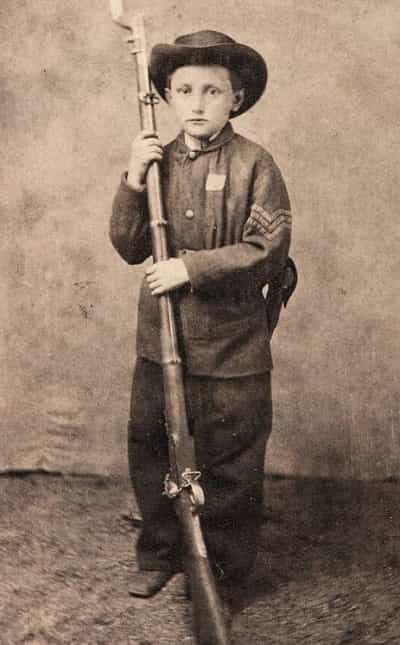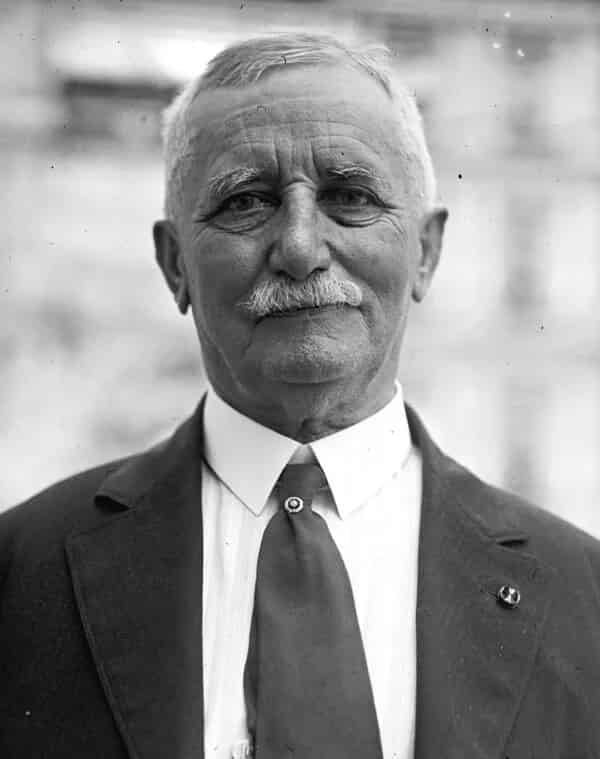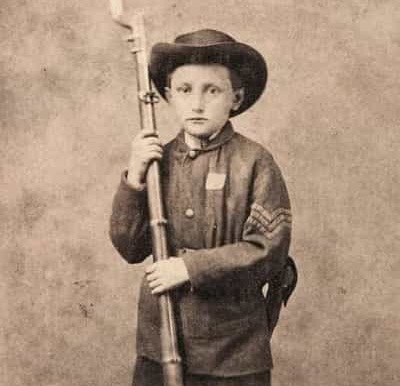The True Story of John Clem, the 12-Year-Old Boy Who Became a Civil War Officer

In May 1861, when President Abraham Lincoln called for volunteers to join the Union Army, a nine-year-old boy named John Clem decided to enlist.
This determined child, later known as the “Drummer Boy of Chickamauga,” went on to make history as the youngest noncommissioned officer in the U.S. Army.
How John Clem Became a Soldier
John Clem was born in Ohio on August 13, 1851. His childhood was marked by tragedy when his mother died in a train accident in 1861. Later that year, when Lincoln called for volunteers to fight in the Civil War, young Clem ran away from home, determined to join the Union Army.
Initially, Clem approached the 3rd Ohio Infantry Regiment and promised that he could “carry a gun if it wasn’t too heavy” or beat a drum. However, the regiment’s officers turned him away because of his age. Undeterred, Clem made his way to the 22nd Michigan Infantry Regiment. The colonel of the regiment reportedly admired his spirit but still hesitated to accept him, saying, “If you were a foot taller and some years older, I might take you.”
Clem’s persistence eventually paid off, and the regiment allowed him to join as an unofficial drummer boy. While he didn’t receive an official salary, the officers chipped in to pay him $13 a month.
Clem was one of many boys who joined the Civil War, despite both the Union and Confederate armies officially forbidding the recruitment of soldiers under 18. While some boys served as drummers, messengers, or orderlies, others, like Clem, found themselves in active combat. Clem’s courage would soon earn him national fame.
The Drummer Boy of Chickamauga
Though some stories claim John Clem fought at the Battle of Shiloh, his first significant action likely occurred at the Battle of Chickamauga in September 1863. This battle, fought in Georgia, was one of the bloodiest of the war, with over 34,000 casualties. Of the 455 men in Clem’s regiment, 389 were captured, wounded, or killed.
During the battle, Clem became separated from his unit as they retreated. Armed with a modified musket small enough for him to carry, Clem encountered a Confederate officer. The officer reportedly laughed and said, “You’re a little fellow to be in this business,” or, as some accounts claim, called him a “damned little Yankee devil.” When the officer demanded his surrender, Clem raised his musket, shot him, and fled.
For his bravery, Clem was promoted to sergeant, making him the youngest noncommissioned officer in U.S. Army history. The press dubbed him the “Drummer Boy of Chickamauga,” and his story spread across the North, providing a rare glimmer of positivity amid the Union’s losses at Chickamauga.
John Clem and the End of the Civil War
After the Battle of Chickamauga, Clem’s luck ran out. Confederate forces captured him in Tennessee but held him for only three days before releasing him in a prisoner exchange. On his way back to his regiment, Clem met General William S. Rosecrans, who was impressed by the young soldier’s bravery and shared his story with newspapers. This helped Clem gain even more fame.
In 1864, new regulations prohibited the enlistment of soldiers under the age of 16. Clem, then 13, was formally discharged and encouraged to focus on his education. Clem wrote to his former comrades in the 22nd Michigan, expressing his gratitude and sharing updates about his schooling.
“I am going to school here and am very much pleased with the institution and my schoolmates,” Clem wrote. “Please tell my Colonel to write to me as soon as he can.”
But Clem’s time in the military was far from over.
John Clem’s Later Military Career
In 1870, five years after the Civil War ended, Clem graduated from high school. President Ulysses S. Grant personally nominated him for West Point, but Clem failed the entrance exam. Still, Grant appointed him as a second lieutenant in the Army.
Clem’s military career spanned 44 years. He served at Fort Brown in Texas, participated in the Spanish-American War, and steadily rose through the ranks. By the time he retired in 1915, Clem was the last active-duty Civil War veteran in the U.S. Army, though some veterans later re-enlisted for World War I.
Clem passed away in 1937 and was buried at Arlington National Cemetery. His tombstone bears the name John Lincoln Clem, a tribute to the president who inspired his military service.
The Legacy of John Clem
John Clem’s story is a remarkable tale of courage and determination. From a nine-year-old runaway to a celebrated Civil War hero and lifelong soldier, Clem’s life reflects the resilience of the human spirit. His legacy continues to inspire, reminding us of the sacrifices made by those who fight for their beliefs — no matter their age.

Frequently Asked Questions (FAQs)
Who was John Clem?
John Clem was a young boy who became the youngest noncommissioned officer in U.S. Army history during the Civil War. He is famously known as the “Drummer Boy of Chickamauga.”
How old was John Clem when he joined the army?
John Clem was just nine years old when he attempted to join the Union Army. He officially became an unofficial drummer boy for the 22nd Michigan Infantry Regiment.
What made John Clem famous?
John Clem gained fame for his bravery at the Battle of Chickamauga in 1863. He reportedly shot a Confederate officer who demanded his surrender and was later promoted to sergeant for his actions.
What happened to John Clem after the Civil War?
After being discharged at age 13, Clem focused on his education. Later, he rejoined the military and served for 44 years, eventually retiring as a brigadier general.
Where is John Clem buried?
John Clem is buried at Arlington National Cemetery. His tombstone reflects his chosen name, John Lincoln Clem, in honor of President Abraham Lincoln.
What is John Clem’s legacy?
John Clem’s story is a testament to courage, determination, and the resilience of the human spirit. He remains an inspiration as one of the most famous child soldiers in U.S. history.

